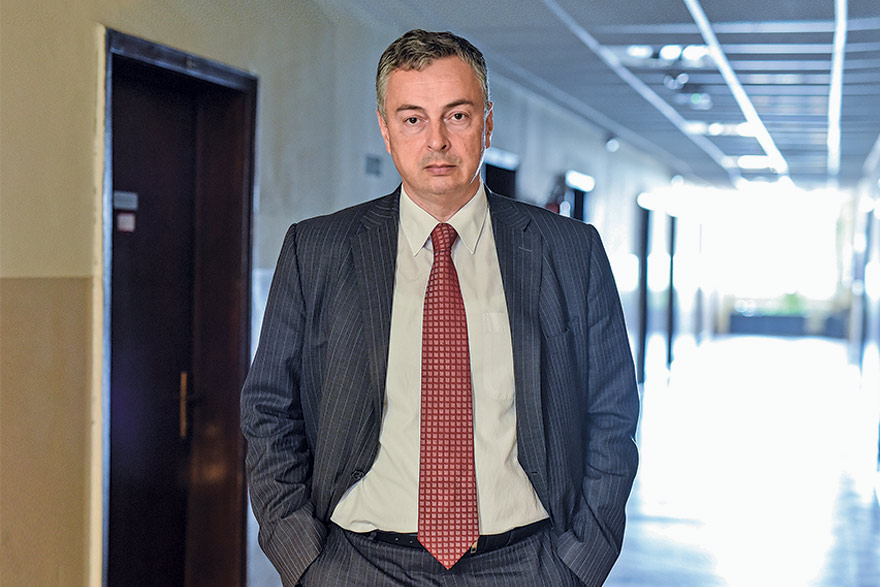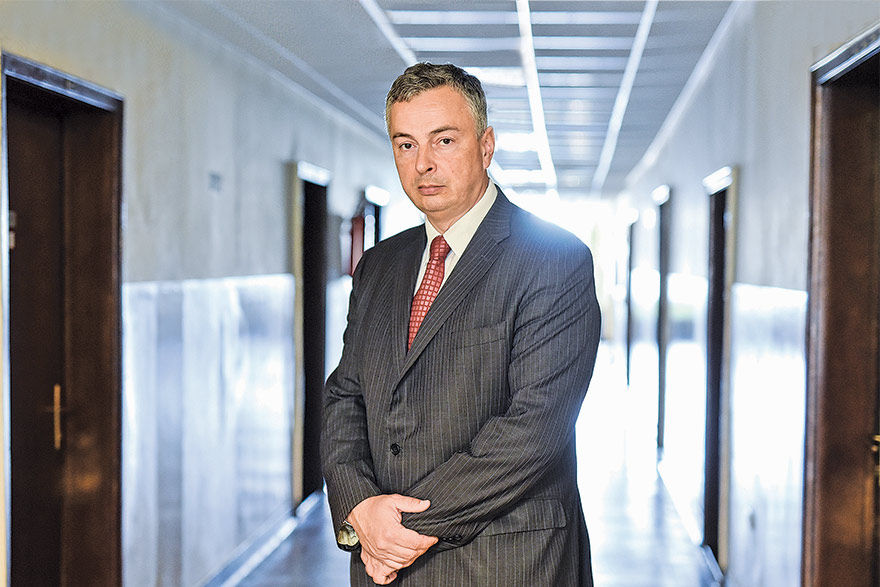The world has been changing rapidly over recent years, under the influence of pandemics, climate change, the development of digitalisation and A.I., and the dynamics of geostrategic relations. Southeast Europe is suffering from specific consequences of these global changes and their impact, but these changes simultaneously represent new opportunities for the region and its future development
The political elites who want to effectively shape policies that will make this region a cohesive community have much to learn from citizens who punish them – through protest, emigration and other ways – for missing opportunities to make this a healthy, technologically advanced part of the world that’s well-connected in terms of global supply chains.
ECOLOGY
Southeast Europe has become one of our continent’s most polluted regions. Poor environmental standards, decrepit and dirty industries, new foreign direct investments with their own poor environmental standards, decades of falling behind on waste collection and recycling systems, wastewater treatment, preventing air pollution and the use of toxic pesticides, but also a traditionally low level of environmental awareness, have led to ecological issues becoming one of the key factors in the poor living standards of the people of the region, but also one of the key reasons prompting them to emigrate.
Nonetheless, important changes in the consciousness of citizens are noticeable, particularly in Serbia. Environmental movements are becoming a key political factor capable of influencing the development of the society as a whole. Here, too, political elites are lagging behind when it comes to understanding the problem and seem not to realise that taxpayers’ money mustn’t be directed towards projects with questionable benefit and real values that are difficult to determine (national stadiums, gondola lifts, monuments etc.), but rather should be directed, immediately and without delay, towards environmental protection (filters for treating air pollution, systems for wastewater treatment, waste collection and recycling etc.) and should adhere to the highest EU standards and be implemented in close cooperation with EU institutions and companies that are global leaders in this domain. Also missing is active education and a higher level of regional cooperation in the area of environmental regulation. It’s meaningless if people on one side of the border succeed in fending off polluters or foreign investors with dirty technologies, only for the same players to get a pass just a few kilome tres away, across a border. Thus, the regional harmonisation of environmental regulations, higher allocations for environmental projects across the entire region and a significantly higher level of regional cooperation in the implementation of environmental projects are required, along with work on the ground to improve environmental education and raise environmental awareness. And all this, of course, should be done in intensive cooperation with the EU, with European institutions and companies, as part of preparations for the region on the road to full EU membership.
It’s meaningless if people on one side of the border succeed in fending off polluters or foreign investors with dirty technologies, only for the same players to get a pass just a few kilometres away, across a border. The regional harmonisation of environmental regulations, higher allocations for environmental projects across the entire region and a significantly higher level of regional cooperation in the implementation of environmental projects are required
MIGRATION
Migration has, over recent years, represented a practically continuous process of population movements from the countries of the Middle East and Africa, via the region of Southeast Europe, to Western and Northern Europe. At the same time, there are also migrations from Southeast Europe towards more developed parts of the world. The region is confronted by insufficient natural population growth and the departures of educated workers with skills that are highly sought-after and better paid abroad. The rapidly declining population, growth in the average age and falling numbers of working age citizens and their competencies represent a serious economic and developmental challenge for this entire region. There can be no economic growth without enough able-bodied and competent people. Positive demographic policies, i.e., higher budget allocations to stimulate natural growth, are a necessary but not nearly sufficient measure to alleviate this problem. Significantly more comprehensive and higher quality education is becoming a key issue of regional development. It should compensate for the departure of a proportion of the skilled section of the population, but also create the basis for the future growth of labour productivity. In parallel with this, the entire region must be regulated in terms of strengthening the rule of law and institutions while combating corruption, because these areas, among others, have become key regional weaknesses which – coupled with low wages and a spoiled environment – have a decisive impact on emigration from our region. Only a combining of demographic policies, significantly broader and better education and institutional development, together with a certain influx of migrants from abroad, can enable the SEE region to preserve its development opportunities in the future.

DIGITALISATION
Under the conditions of the pandemic, digitalisation has accelerated and (already with the existing technology) changed the way business meetings unfold, discussions and conferences are held, teaching and education are delivered, documents are sent, contracts are concluded, orders and payments are made and trade is implemented, as well as many other activities. We have discovered that digitalisation can save time and reduce essentially unnecessary travel and, accordingly, also reduce risks and harmful emissions. Digitalisation also represents a regional development opportunity. This isn’t only an opportunity to affirm regional start-ups in this field, but also an opportunity to make positive changes in all other segments of the economy. The simplification of procurement, marketing, sales and payments of products and services can come as a direct consequence of digitalisation, and is doing so already. Opportunities that didn’t previously exist are being created. Thus, for example, traditional agricultural and other activities in passive areas (agricultural produce, handicrafts, tourism etc.) that are today recognised as having ecological and organic values can much more easily find routes to higher prices, new customers and completely new perspectives under the conditions of digitalisation. Likewise, regional trade and transport can be made incomparably simpler, cheaper and faster with digital certificates, mobile applications and other technological solutions that may render waiting at borders, paying tolls and other related costs of time and money unnecessary. In order to ensure the greater and optimal use of the economic development potentials of digitalisation in the region, the need for high-quality education in this area again imposes itself as being crucial, as do greater investment in digital infrastructure, the regional standardisation and harmonisation of digital solutions, and the improvement of regional legislation to support digitalisation.
The inclusion of the region’s countries in international organisations that are predominantly present across the rest of Europe could contribute to Southeast Europe finally turning away from the path on which geostrategic interests clash to join the path on which dynamic economic development and cooperation unfold
SUPPLY CHAINS
The pandemic has revealed that global supply chains are more sensitive than previously understood. Whether some ship got stuck in the Suez Canal or ships ended up congested and waiting to unload at some ports, or empty containers were massed inadequately in some parts of the world, it all contributed to the solidifying conviction that suppliers should be closer and more reliable in order to avoid production standstills. Southeast Europe previously also had an opportunity to combine its relative proximity to the EU market and relatively low labour costs to become a natural destination for economic activity in areas where a product or service needs to be quickly made available on the EU market. Now, on the basis of the experience of the pandemic and the halts and interruptions that hit some supply chains, a new opportunity is emerging to relocate production operations previously based in the Far East to Southeast Europe. In other words, Southeast Europe is gaining a new development opportunity in the context of the future localising of supply chains among large EU companies. In order for this chance to become a reality, the level of education must be raised to a higher level, to improve the skills of the workforce, while the overall regional infrastructure also needs to be developed to provide faster links with the EU market. So, again, education and regional cooperation are key, albeit this time in the domain of building transport infrastructure. In order for the region to take full advantage of the development potential of this opportunity, it is necessary for the countries of Southeast Europe to form a common regional market to a much greater extent, so that companies from the region that gain new export jobs in the EU can turn mostly to regional suppliers and can – by trading with each other and exporting to the EU – create greater economic development for the region as a whole. It could be said: a good job and the development and enrichment of our neighbour should bring us happiness, because we will thus be able to sell more to that neighbour tomorrow.
GEOSTRATEGIC RELATIONS
Southeast Europe has traditionally been a stage for conflicts of geostrategic interests that have mostly, throughout history and even today, brought suffering and proved detrimental to the local population. Divisions within the region still exist today when it comes to membership in international organisations. This division incumbers regional cooperation and economic development. In the case of EU membership, this division is already creating regional differences and inequalities, and will do so even more if it continues for an inordinate period, because huge funds are flowing from the EU to its member states in Southeast Europe. At the same time, the absence of membership in the same military alliance leads to additional arms expenditures and perpetuates some sources of regional tension. Perhaps some centres of geostrategic power benefit from this, but it isn’t good for the long-term development of Southeast Europe. The inclusion of the region’s countries in international organisations that are predominantly present across the rest of Europe could contribute to Southeast Europe finally turning away from the path on which geostrategic interests clash to join the path on which dynamic economic development and cooperation unfold.
